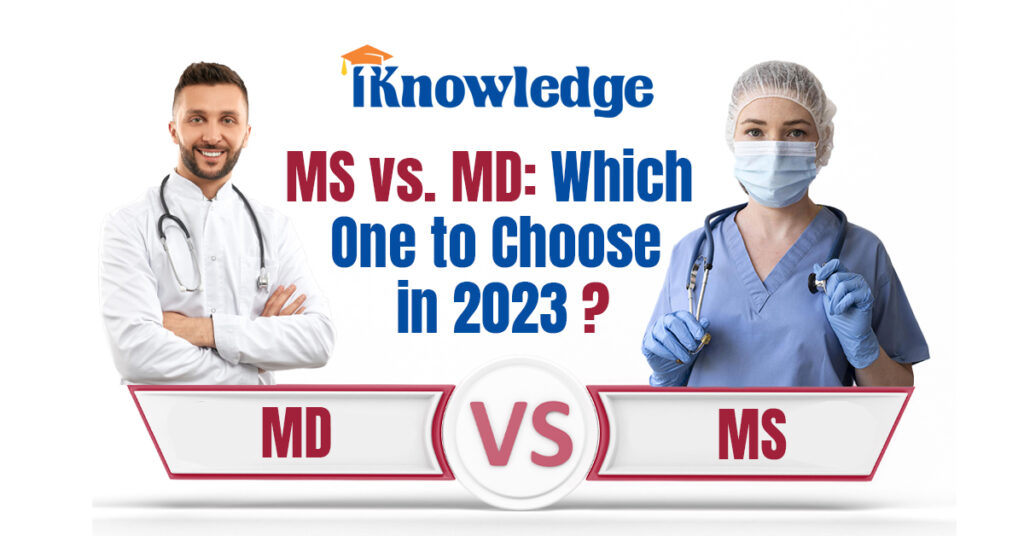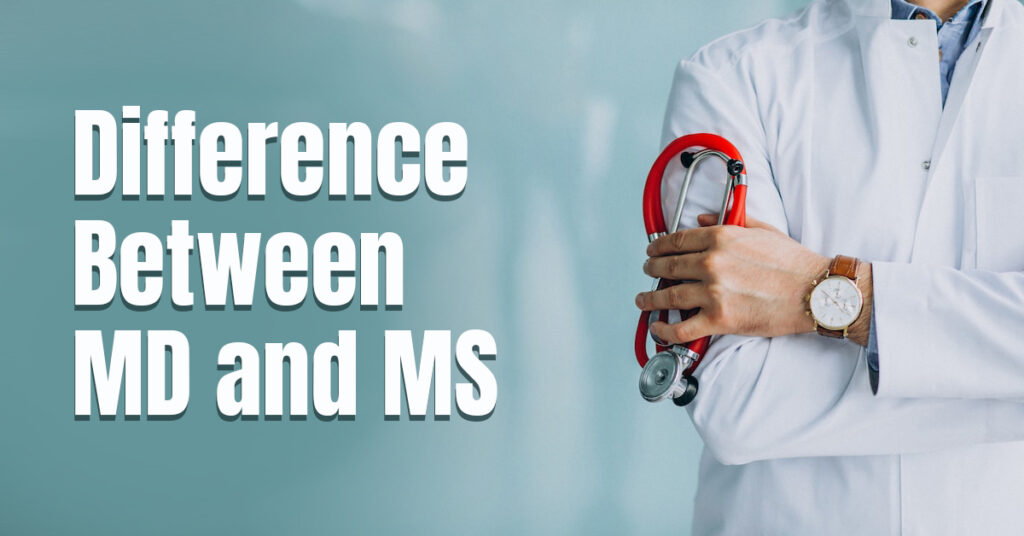
Are you an MBBS graduate wondering about your next step in the medical field? The world of medicine offers a plethora of opportunities for specialization and advanced education. Two popular choices among graduates are Doctor of Medicine (MD) and Master of Surgery (MS). But which one should you choose? In this blog post, we’ll explore the highlights, eligibility criteria, specializations and entrance examinations for MD MS courses. Join us as we unravel the differences between these two fascinating fields to help you make an informed decision regarding your future in medicine!
Why should you pursue PG medical courses after MBBS?
After completing the MBBS degree, many students face a dilemma about whether to pursue post-graduation or start practicing. Pursuing PG medical courses after MBBS has numerous benefits and can lead to a more successful career in medicine.
PG medical courses provide specialization in various fields of medicine. This enables you to gain expertise in your area of interest and boosts your chances of getting selected for high-paying job opportunities.
Secondly, pursuing post-graduation enhances your knowledge and skills in your chosen field. You get hands-on experience with advanced equipment and techniques that are not available during under-graduation.
In addition, having an MD/MS degree increases credibility among colleagues and patients alike. It signifies higher levels of education and dedication toward the profession.
Moreover, some positions require a postgraduate degree as eligibility criteria such as teaching staff or research scholars which could help secure future employment opportunities easily
Pursuing a PG medical course after MBBS is highly recommended for those who seek further professional growth within their field of interest.
What is a Doctor of Medicine?
A Doctor of Medicine (MD) degree is a postgraduate course in the medical field that focuses on the diagnosis, treatment, and prevention of diseases. It is an advanced program that builds on the knowledge acquired during undergraduate studies in medicine.
The MD program typically covers various subjects such as anatomy, physiology, pharmacology, pathology, and microbiology. Students also learn clinical skills through practical training in hospitals and clinics.
One highlight of pursuing an MD degree is that it equips you with a comprehensive understanding of medical science. You will gain expertise in diagnosing illnesses and identifying appropriate treatments for patients. This knowledge can be applied to diverse fields such as public health or research positions.
Another advantage of obtaining an MD degree is the potential earning power associated with it. Physicians are among the highest-paid professionals worldwide due to their specialized skills and expertise.
Pursuing an MD degree takes time commitment but offers a wealth of benefits for those passionate about helping others through healthcare services.
What is a Master of Surgery?
A Master of Surgery (MS) is a postgraduate medical course that focuses on surgical procedures and techniques. This program provides students with advanced knowledge and skills needed for performing complex surgeries in various fields such as gynecology, orthopedics, neurosurgery, plastic surgery, and more.
The MS curriculum includes both theoretical and practical training to prepare students for real-world situations in the operating room. The courses cover anatomy, physiology, pharmacology, and microbiology as well as specialized surgical topics like laparoscopic surgery or robotic-assisted surgery.
One of the highlights of an MS program is that it offers hands-on experience through internships or residencies at top hospitals. Students get to observe and assist experienced surgeons during surgeries which can help them gain critical skills required for their future careers.
Another benefit of pursuing an MS degree is its high demand in the job market. Surgeons are always needed in various healthcare settings such as private clinics or public hospitals so graduates have plenty of opportunities available after completing their degree.
A Master of Surgery degree prepares graduates with the advanced knowledge and technical skills necessary to become successful surgeons capable of handling challenging cases with confidence.
Difference between MD and MS

| MD | MS |
| Stands for Doctor of Medicine | Stands for Master of Surgery |
| Focuses on medical diagnosis, treatment, and prevention | Focuses on surgical procedures |
| Generally requires completion of a medical degree | Generally requires completion of an undergraduate degree in medicine or a related field |
| Typically takes 4-5 years to complete | Typically takes 2-3 years to complete |
| Includes classroom and clinical training in various medical specialties | Includes classroom and clinical training in various surgical specialties |
| Offers specializations in fields such as cardiology, pediatrics, and neurology, among others | Offers specializations in fields such as general surgery, orthopedics, and neurosurgery, among others |
| Allows graduates to work as medical doctors in a variety of settings | Allows graduates to work as surgeons in a variety of settings |
| Often involves research opportunities and may require a research project or thesis | Often involves research opportunities and may require a research project or thesis focused on surgical procedures |
MD/MS 2023 eligibility criteria
To pursue a PG medical course in India, candidates must meet certain eligibility criteria. For MD/MS 2023, aspiring medical students must have completed their MBBS degree from an MCI-recognized college or university. Additionally, they should have completed their compulsory internship by March 31st, 2023.
Candidates belonging to the general category are required to score at least 50% aggregate marks in their MBBS exams. On the other hand, candidates belonging to reserved categories such as SC/ST/OBC are required to score at least 40% aggregate marks in their MBBS exams.
Furthermore, aspirants must clear the NEET-PG entrance exam with a qualifying percentile decided by the NBE (National Board of Examinations). Only those who meet these eligibility criteria will be granted admission into MD/MS programs for the academic year of 2023.
It is essential that aspiring medical students keep track of these requirements and prepare accordingly for this highly competitive field.
MD/MS 2023 specializations
After completing your MBBS degree, you can pursue a postgraduate course in either MD or MS. These courses have different specializations that cater to specific medical fields.
MD courses offer specializations like General Medicine, Pediatrics, Dermatology, Radiology, Anesthesia, and many more. If you are interested in treating patients with chronic illnesses or specializing in the diagnosis and treatment of skin diseases or interpreting diagnostic images like x-rays and MRIs then an MD course could be right for you.
On the other hand, MS courses offer specializations like General Surgery, Orthopaedics Surgery, Ophthalmology, ENT (Ear Nose Throat), and Obstetrics & Gynecology amongst others. This means if you are passionate about performing surgical procedures on patients suffering from injuries or disabilities affecting their bones and joints or caring for women during pregnancy then pursuing an MS course might be the best option for you.
Choosing between MD/MS 2023 specialization will depend on your interest areas as well as the scope of these specialties within the healthcare sector. It is essential to research all available options before making a final decision so that it aligns with your career goals while also fulfilling societal needs within India’s healthcare system.
MD & MS Program Top Colleges

Choosing the right college is crucial for any student pursuing higher education. For those interested in MD/MS programs, it’s important to research and selects a college that provides quality education and practical training.
Several top colleges offer MD/MS programs in India, including All India Institute of Medical Sciences (AIIMS), Christian Medical College (CMC), Post Graduate Institute of Medical Education and Research (PGIMER), Maulana Azad Medical College (MAMC) and Armed Forces Medical College (AFMC).
AIIMS, with its reputation as one of the best medical colleges in India, has consistently ranked first among medical colleges offering MD/MS courses. CMC Vellore is renowned for its excellent academic curriculum and hands-on clinical experience. PGIMER Chandigarh boasts state-of-the-art facilities coupled with experienced faculty members. MAMC Delhi is another top choice for students seeking an affordable yet high-quality medical education. AFMC Pune offers extensive military training along with regular coursework.
Choosing the right college can make all the difference in your career path as a doctor or surgeon. It’s important to weigh all your options before making a decision on where to pursue your MD/MS degree program.
Entrance examinations for MD MS courses
Entrance examinations are an important step in pursuing MD or MS courses after MBBS. These exams test the knowledge and skills of candidates to determine if they are eligible for higher education in medicine. Some of the popular entrance exams for MD and MS programs include NEET-PG, AIIMS PG, JIPMER PG, PGI Chandigarh, and COMEDK.
NEET-PG is a national-level exam conducted by the NBE (National Board of Examinations) that allows students to apply for various postgraduate medical programs across India. Meanwhile, AIIMS PG is an entrance exam conducted by the All India Institute Of Medical Sciences (AIIMS), which offers admission to their post-graduation courses.
Similarly, JIPMER PG Exam provides entry into 200 seats available under different disciplines while PGI Chandigarh holds a separate entrance examination called the Post Graduate Institute Of Medical Education And Research Entrance Exam (PGIMER). The Consortium Of Medical Engineering And Dental Colleges of Karnataka (COMEDK) administers its own entrance exam called as the COMEDK Under Graduate Entrance Test.
It’s essential to understand each exam’s format, eligibility criteria, and syllabus before applying. Candidates should regularly prepare with study materials from previous years’ question papers along with mock tests and online tutorials. With proper preparation and determination towards achieving academic excellence in Medicine awaits every candidate who wishes to pursue their dreams through MD/MS courses!
Which is better MD or MS?
When it comes to choosing between MD and MS, there is no clear answer as to which one is better. Ultimately, it will rely on your interests and career goals.
If you are interested in medical research or teaching, then an MD might be the better option for you. On the other hand, if you have a passion for surgery and want to specialize in surgical procedures, then MS could be a more suitable choice.
MD programs focus on the diagnosis and treatment of illnesses through medication and non-surgical means. During an MD program, students learn about patient care management, human anatomy, pharmacology, and clinical examination techniques.
MS programs focus primarily on surgical procedures that require technical skills. Students who pursue this course will spend time learning how to perform surgeries like transplants or reconstructive surgeries etc., also they get great exposure during their training period.
However, regardless of which path you choose, both degrees require significant amounts of hard work and dedication – with rigorous coursework followed by hands-on experience through internships or residency programs at top hospitals around the world.
Conclusion
Choosing between an MD and MS degree is a critical decision that requires careful consideration of your career goals, personal philosophy, program availability, financial considerations, and work-life balance. Each degree offers unique benefits and challenges, and the decision ultimately comes down to what is best for you. Both MD and MS after MBBS can help medical students gain advanced knowledge and specialize in their area of interest, opening up opportunities for a successful career in medicine.